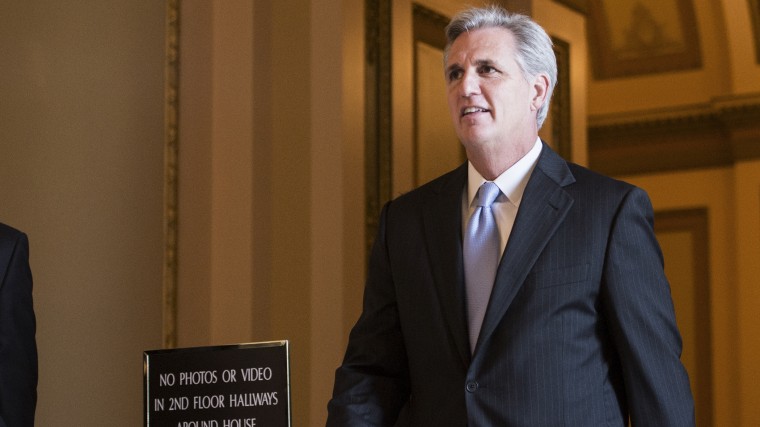It's been four years since congressional Republicans took control of the U.S. House, during which time Congress has approved no meaningful legislation, and GOP lawmakers have shown no real interest in governing. But as Jake Sherman reported, the House Majority Leader thinks his party can finally get on track in 2015.
House Majority Leader Kevin McCarthy landed here from Los Angeles with a bang: He bluntly warned that Republicans will blow the presidency in 2016 if they don't make some radical changes -- and quick. McCarthy, speaking without a working microphone, told a group of Long Island donors that Republicans' gains in the House will amount to little if they can't govern over the next two years."I do know this," McCarthy said. "If we don't capture the House stronger, and the Senate, and prove we could govern, there won't be a Republican president in 2016."
McCarthy's hope that Republicans can prove they "could govern" struck me as an interesting choice of words. Perhaps it was just a verbal slip, or perhaps it was the Majority Leader's way of lowering expectations -- GOP lawmakers don't actually expect to succeed in making policy, but they hope to prove they could govern under different circumstances.
To be sure, Republicans have reason to be optimistic about seizing control of Congress. The party may be unpopular, may have unpopular ideas, and may have failed miserably to govern over the last several years, but voters appear likely to reward the GOP with more power anyway.
As such, it's only natural to wonder what the public might expect from Republican control of Capitol Hill. McCarthy wants to paint a sunny picture: the GOP, he says, will focus on real policy solutions.
The problem, of course, is that there's literally no reason whatsoever to believe him.
Part of the problem, as Greg Sargent explained well yesterday, is that GOP leaders don't even seem to agree among themselves what they should do with their power. Sen. Mitch McConnell (R-Ky.), soon to be Senate Majority Leader if the polls are correct, has made it quite clear that he intends to create a series of government-shutdown standoffs to force President Obama to accept far-right demands. McCarthy, on the other hand, told Politico the exact opposite, saying he has no use for brinksmanship and forced crises.
Which Republican leader is correct? I haven't the foggiest idea, but more to the point, they haven't any idea, either. The right hand already doesn't know what the far-right hand is doing, and the GOP hasn't even seized control of Capitol Hill yet.
But another part of the problem is the flawed premise of McCarthy's vision. As the House Majority Leader sees it, the biggest obstacle to Republicans governing responsibly is the Senate Democratic majority. Put the GOP in charge of the upper chamber, the argument goes, and we'll finally see Republicans act like grown-ups.
It's a nice idea, but it's also absurd. Remember, when we last checked in on McCarthy's legislative efforts, he was failing miserably to rally support from his own members to support their own awful border bill. What did this have to do with Harry Reid? Nothing.
House Republicans couldn't work on immigration for reasons that had nothing to do with the Senate. They couldn't come up with a health-care plan for reasons that had nothing to do with the Senate. They can't even sue the president properly.
Note, I'm not accusing McCarthy of dishonesty, per se. He's almost certainly sincere. I suspect, in his heart of hearts, the Majority Leader really would like to show the public that his party is capable of passing bills into law.
If anything, the problem here is one of naivete. McCarthy is under the impression that post-policy Republican lawmakers, who've shown no interest in serious policymaking for many years, will suddenly bring maturity and thoughtfulness to the legislative process once the GOP has even more power.
There's simply no reason to believe that's true. Indeed, all available evidence points in the exact opposite direction.
